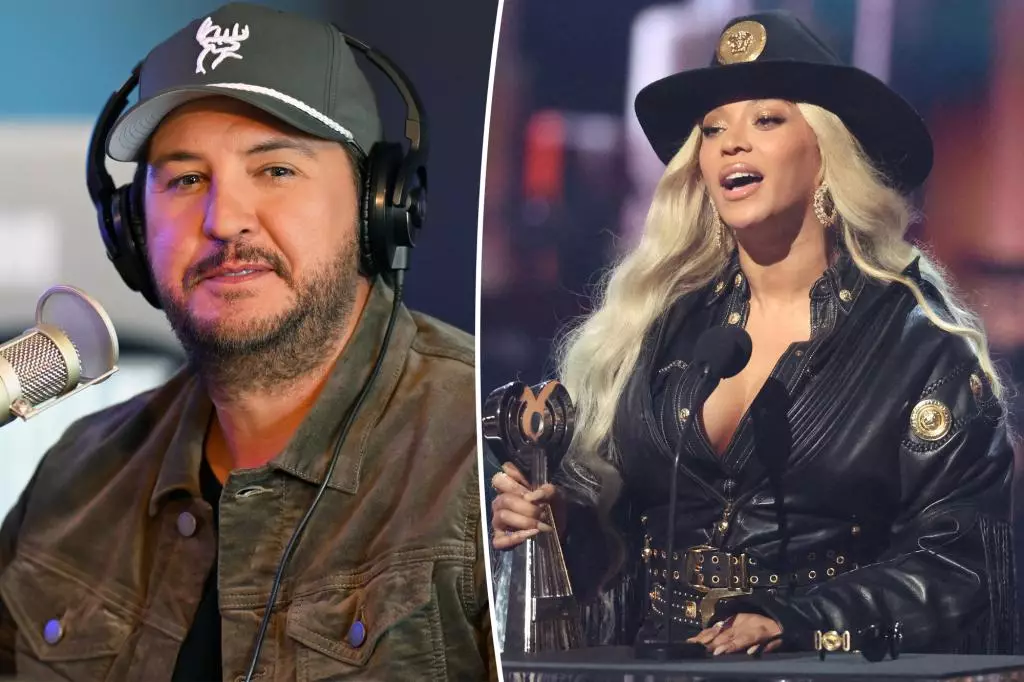The intersection of genres has been a prominent theme throughout the history of music, and few artists have navigated this terrain as intriguingly as Beyoncé. Her foray into country music with her album “Cowboy Carter” has stirred debate among country artists and fans alike, raising questions about what it means to belong within a musical community. Luke Bryan’s recent comments on the lack of Country Music Association (CMA) nominations for Beyoncé underscore this ongoing tension, as they encompass a broader conversation about inclusion, authenticity, and the dynamics of gender within the industry.
Luke Bryan pointed out that while Beyoncé’s debut country effort reached impressive commercial milestones, its absence from CMA nominations signals a deeper resistance to artists from outside the traditional country mold. In his reflection, Bryan suggested that while music should be an open and welcoming space, those looking to enter a new genre must actively engage with its community. This idea of needing to “come into our world” reflects an inherent gatekeeping mentality that can exist in music, where genuine authenticity is often tied to an artist’s established roots in a genre.
Bryan’s assertion that Beyoncé should have participated more in the CMA community highlights a potential hypocrisy in the industry: the belittling of commercial success when it comes from non-traditional artists. The CMA awards are notorious for upholding a certain image of country music, one that often prioritizes long-standing industry relationships over fresh perspectives. Despite how “Cowboy Carter” resonated with listeners, the lack of recognition at the CMA awards raises the question of whether success measured by record sales is enough to gain acceptance by the country music establishment.
Dolly Parton spoke out in defense of the CMA voting committee, noting how difficult it is for new entrants, particularly those from pop backgrounds, to break through the established norms of country music. Her remarks further illustrate the complexity of the situation; while Parton acknowledges the quality of Beyoncé’s work, she also points out the multitude of dedicated country artists who might not appreciate their space being occupied by someone less entrenched in the genre. Such comments reveal a conflicting allegiance to a system that rewards familiar faces over innovation, complicating Beyoncé’s position within the country music framework.
Community and Music: Lessons from Kelly Clarkson
Kelly Clarkson’s experience in attempting to crossover into country music further illuminates the challenges non-country artists face. Clarkson reported being advised that her pop successes would hinder her opportunities in country, demonstrating a stark focus on genre purity that often prioritizes tradition over evolution. The resistance to artists like Clarkson and Beyoncé illustrates a protective mechanism within country music, one that arguably stifles diverse talent and hinders growth.
In her own words, Beyoncé faced significant backlash when she first ventured into country with her performance at the CMAs. She alluded to feelings of exclusion, stemming from historical narratives that have, in many ways, dictated who gets to participate in which genres. When Beyoncé referred to her struggles in gaining acceptance and her deep dive into country history, it became clear that her intentions were not mere opportunism but rather a sincere effort to engage with the musical forms that resonate with her composition style.
As the music industry continues to evolve, the lines between genres blur more each day. Artists are increasingly drawing from a myriad of influences, creating hybrid sounds that challenge traditional definitions of genre. Beyoncé’s work exemplifies this shift, encouraging artists working across genres to embrace their multifaceted identities. The conversation sparked by her album may serve as a catalyst for greater acceptance within the country music community.
While both Bryan and Parton highlight the challenges faced by artists who breach genre boundaries, their comments might indicate an opportunity for dialogue rather than division. The need for increased inclusivity and understanding could pave the way for a music landscape that values artistry over traditional definition, and for established musicians to appreciate the influences of new entrants rather than disregard them altogether.
The discourse surrounding Beyoncé’s impact on country music should not serve merely to critique but should foster a deeper examination of genre identity, community expectations, and the wisdom of embracing diversity in musical artistry. The evolving landscape of music composition must be recognized as an opportunity for connection rather than a barrier to entry, with each artist contributing uniquely to the cultural tapestry that defines us.

